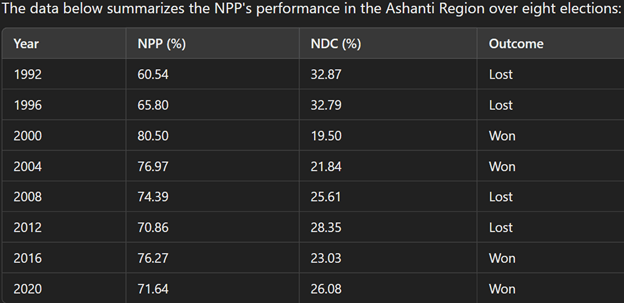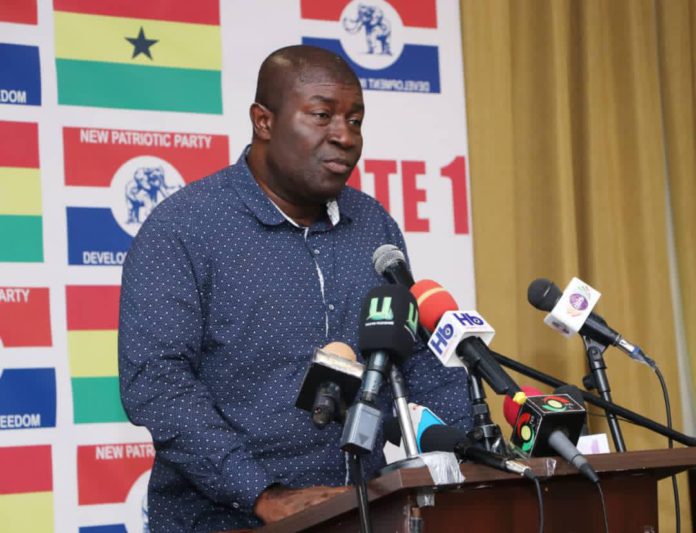Ghana’s voters will elect a new president in less than 16 days. Campaigns have intensified, with many political bigwigs taking every opportunity to sell their mandates and visions ahead of Dec. 7, 2024.
On the road to elections, on Nov. 13, 2024, Nana Akomea, Vice Chairman of Dr Mahamudu Bawumia’s campaign team, appeared on GH Today on GHOne TV and made a claim that sparked much debate.
According to Nana Akomea, if the New Patriotic Party (NPP) secures 75% of the votes in the Ashanti Region, they will win the 2024 presidential election.
However, is this claim valid, or does historical data present a more complex picture?
The Ashanti Region: A key stronghold for the NPP
The Ashanti Region is widely regarded as the NPP’s traditional stronghold, with a long history of overwhelming support for the party in presidential elections.
This region is crucial to the NPP’s electoral strategy, contributing significantly to their national vote tally.
Given its size and political importance, a strong performance in Ashanti is often seen as a major factor in securing victory at the national level.
The 75% Target: Fact or fiction?
Nana Akomea’s statement implies that achieving 75% of the vote in Ashanti guarantees a national win for the NPP.
This assertion may seem plausible on the surface, especially given the NPP’s history of strong performance in the region.
However, a closer look at the historical data reveals a more nuanced reality.
A Review of NPP’s Performance in Ashanti from 1992 to 2020
To assess the claim’s validity, it is important to analyse voting patterns in the Ashanti Region over the years and how they correspond with national election outcomes.
Here’s a summary of the NPP’s vote share in Ashanti during presidential elections from 1992 to 2020:
- 1992 Election: In the 1992 election, Albert Adu Boahen of the NPP received 60.54% of the total votes in Ashanti, but the party lost the national election to Jerry John Rawlings of the NDC.
- 1996 Election: John Agyekum Kufuor of the NPP garnered 65.8% of votes in Ashanti but still lost the national election to Jerry John Rawlings.
- 2000 Election: In the 2000 election, Kufuor achieved 80.5% of the Ashanti vote and won the national election against John Evans Atta Mills of the NDC.
- 2004 Election: Kufuor again won 76.97% of the votes in Ashanti and secured a second term as president.
- 2008 Election: In this election, Nana Akufo-Addo of the NPP won 74.39% of the votes in Ashanti but lost the national election to John Atta Mills of the NDC. The NPP’s performance in other regions, such as Greater Accra and the Volta Region, was much weaker, contributing to their loss.
- 2012 Election: Nana Akufo-Addo won 70.86% of votes in Ashanti but lost the election to John Mahama of the NDC, primarily due to strong support for Mahama in other regions.
- 2016 Election: In the 2016 election, Akufo-Addo secured 76.27% of the votes in Ashanti and won the national election, defeating John Mahama.
- 2020 Election: In the most recent election, Akufo-Addo secured 71.64% of the votes in Ashanti and still won the national election against John Mahama, illustrating that other regions played a significant role in securing victory.

Key observations made by DUBAWA
From the historical data, DUBAWA made the following key observations about the NPP’s performance in Ashanti and its correlation with national outcomes:
- When the NPP secured over 75% in Ashanti: In the years 2000, 2004, and 2016, the NPP won more than 75% of the votes in Ashanti, and in all three cases, they won the national election.
This trend suggests that a strong performance in Ashanti can be a strong foundation for an NPP victory.
- When the NPP secured less than 75% in Ashanti: In 1992, 1996, 2012, and 2020, the NPP did not secure the national election because the support, though significant, was less than 75% in Ashanti.
This shows that securing a high percentage of votes in Ashanti alone does not guarantee a national win if the NPP performs poorly in other regions.
- 2008 election: The 2008 election is a notable outlier. In this election, Nana Akufo-Addo secured 74.39% of the votes in Ashanti, a figure close to the 75% threshold.
Despite this strong showing in Ashanti, the NPP lost the national election, largely due to weak performance in other key regions like Greater Accra and Volta, which were strongholds for the NDC.
- The Importance of Other Regions: The 2020 election provides further evidence that winning Ashanti by a large margin does not automatically ensure victory.
Despite securing 71.64% of the votes in Ashanti, Akufo-Addo’s victory was secured through strong support in other regions, particularly Greater Accra, which played a decisive role in his win.

Conclusion
While securing 75% of the vote in the Ashanti Region greatly increases the NPP’s chances of winning the national election, it is not guaranteed.
Historical evidence suggests that the party’s performance in other regions, particularly in swing areas like Greater Accra and Central Region is in determining the overall winner.
The 2008 election serves as a cautionary tale, where even a high percentage of votes in Ashanti could not overcome losses in other regions.
Similarly, the 2020 election demonstrated that the NPP could still win without reaching 75% in Ashanti, provided they performed well in other key regions.
In conclusion, while a 75% vote share in Ashanti strengthens the NPP’s position, it does not automatically result in a national win.
To secure victory in 2024, the NPP will need to perform well in Ashanti and other critical regions across the country.
Source: ghana.dubawa.org


